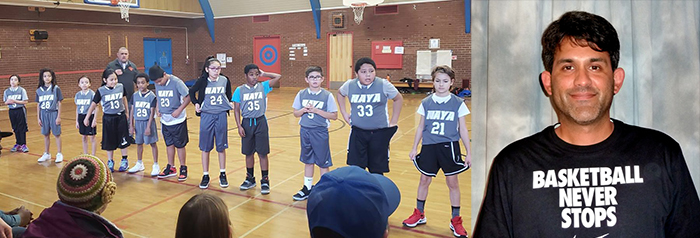NAYA’s Micah Johnson continues tradition of using sports to teach life skills
It’s a common misperception that, in pre-contact days, the daily lives of Native people were filled only with toil and a desperate fight for survival. In reality, communities enjoyed recreational activities, including sports and games. Such activities often reinforced skills that complemented work that needed to be done.
For example, physical fitness, strength, and agility were valuable skills for subsistence activities and protection. Dexterity, endurance, and the power of deduction helped with other necessary tasks, even governance. Games and sports were also a popular way for the community to come together for enjoyment.
NAYA continues in this tradition by offering youth in the community opportunities to learn and practice Indigenous games during summer camp and Culture Night. Under the leadership of longtime Recreation Coordinator Micah Johnson, Umatilla, youth of all ages can also join sports leagues within the community.
NAYA’s youth recreation programs offer sports year-round. In the fall, volleyball dominates, while winter is all about basketball. Spring means volleyball again and some soccer, while NAYA’s camps and Indigenous games fill the summer. Depending on the sport, youth from 4th grade to high school can join NAYA’s teams.
For Johnson, his role overseeing all the many teams, tournaments, and events is a job near and dear to his heart. “I’ve always loved youth sports and getting to see the growth and progression even within the same age groups. I’ve always wanted to work in sports and I’ve always wanted to serve the Native community. This job is very much what I wanted to do in some way, shape, or form.”
Just as Native people used sports and games to convey life lessons, so do NAYA’s programs provide a sense of discipline, physical health, personal responsibility, and connection to community and culture. According to Johnson, “A big challenge facing youth today is finding out where they fit in at school. At that age everyone’s trying to figure out where they belong. Sports are a great way to make that connection and be around other Native kids like them.”
For some Native youth who have been especially disconnected from their community—or have had negative experiences in the education system—this journey can be bumpy. Johnson explains, “When new kids come into the program, they can be very standoffish, almost like they’re saying, ‘Give me one reason why I should trust you.’ They’re testing to see if our teams are like school.”
“But with them, I try to show consistency,” he continues. “I let them know, ‘I’m going to be here with a basketball for you to shoot. I’m not going to yell at you.’ Lots of times, the kids who have the most challenges at the start are the ones that come all the way around and end up giving you a lot of support as a coach.”
For Johnson, mentoring youth through sports means he gets to witness all of the positive outcomes of the program firsthand. Within one season, the self-confidence of youth can build tremendously. “When kids are discouraged and tell me they’re not good, I tell them that NAYA is the perfect place to get started. We have all skill levels from advanced players to beginners. You can actually see kids get better. It always feels good to see a kid who comes into the programs, say as a 7th grader, and then the next year, they’ve moved on to a different team on an advanced level. They took the basic skills they learned from us, advanced, and will hopefully keep going.”
For some, the self-discipline and personal responsibility taught through NAYA’s sports programs has a tremendous impact on their academics. “For our young men, sometimes finding the motivation to be into their education is challenging,” Johnson states. “I like using sports to help connect them to the whole education system. It’s great to see kids staying at NAYA after practice to visit the Learning Center, instead of going and doing something else. I just enjoy seeing how one positive choice made by kids leads to others.”
Finally, NAYA’s teams provide a steppingstone for youth to connect with the Native community and their culture. Johnson elaborates, “We have a lot of kids who could participate in their schools’ sports right there after school, but ask their families to take them across town to be with us. It’s because they want to be around their Native friends and a Native coach that they feel comfortable with.”
Over time, Johnson sees those same youth that have struggled with fitting in elsewhere becoming immersed in the NAYA family. NAYA sports programming provides youth with a camaraderie based in shared interests. It also creates a sense of family and connection based in a shared culture. According to Johnson, these bonds can grow strong.
He states, “It always makes me feel proud when I see one of our teams finish up their game and then head across town to go cheer on another. They may not even necessarily be friends but because they’re all NAYA kids, they want to go and support them.”
With over 15 years of experience at NAYA, helping shape and guide such positive transformations and community-building for youth, Johnson says it’s the kids that keeps him at NAYA, “I tell them, ‘As long people want you to keep playing games, keep playing games! It’s fun. It’s healthy. Play games as long as you can.’”
He continues, “I have a talk with them at the end of every season when everyone is sad because we know that the next season, we won’t have every person back on the team again. But I’m never as sad as they are because for me, when the calendar flips, I know I’ll always get a new group of kids. I love sports and knowing there’s always going to be another crew of youth to work with.”
